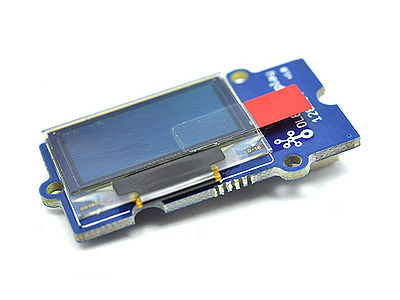API for SSD1308 I2C-controlled OLED displays.
More...
SSD1308 is a 128x64 dot-matrix OLED/PLED segment driver with a controller. This implementation was tested using the Grove LED 128×64 Display module, which is an OLED monochrome display.
lcd->
draw(intel_logo, 1024);
delete lcd;
|
| | SSD1308 (int bus, int address=0x3C) |
| |
| | ~SSD1308 () |
| |
| mraa::Result | draw (uint8_t *data, int bytes) |
| |
| mraa::Result | write (std::string msg) |
| |
| mraa::Result | setCursor (int row, int column) |
| |
| mraa::Result | clear () |
| |
| mraa::Result | home () |
| |
|
mraa::Result | write (int x, int y, std::string msg) |
| |
|
std::string | name () |
| |
| SSD1308 |
( |
int |
bus, |
|
|
int |
address = 0x3C |
|
) |
| |
SSD1308 constructor; calls libmraa initialisation functions
- Parameters
-
| bus | I2C bus to use |
| address | Slave address the LCD is registered on |
| mraa::Result draw |
( |
uint8_t * |
data, |
|
|
int |
bytes |
|
) |
| |
Draws an image; see examples/python/make_oled_pic.py for an explanation of how pixels are mapped to bytes
- Parameters
-
| data | Buffer to read |
| bytes | Number of bytes to read from the pointer |
- Returns
- Result of the operation
| mraa::Result write |
( |
std::string |
msg | ) |
|
|
virtual |
Writes a string to the LCD
- Parameters
-
| msg | std::string to write to the display; note: only ASCII characters are supported |
- Returns
- Result of the operation
Implements LCD.
| mraa::Result setCursor |
( |
int |
row, |
|
|
int |
column |
|
) |
| |
|
virtual |
Sets the cursor to specified coordinates
- Parameters
-
| row | Row to set the cursor to |
| column | Column to set the cursor to |
- Returns
- Result of the operation
Implements LCD.
Clears the display of all characters
- Returns
- Result of the operation
Implements LCD.
Returns to the original coordinates (0,0)
- Returns
- Result of the operation
Implements LCD.
The documentation for this class was generated from the following files:
- /iotdk/jenkins/workspace/upm-doc-stable/src/lcd/ssd1308.hpp
- /iotdk/jenkins/workspace/upm-doc-stable/src/lcd/ssd1308.cxx

 Public Member Functions inherited from LCD
Public Member Functions inherited from LCD Protected Attributes inherited from LCD
Protected Attributes inherited from LCD






 1.8.6
1.8.6